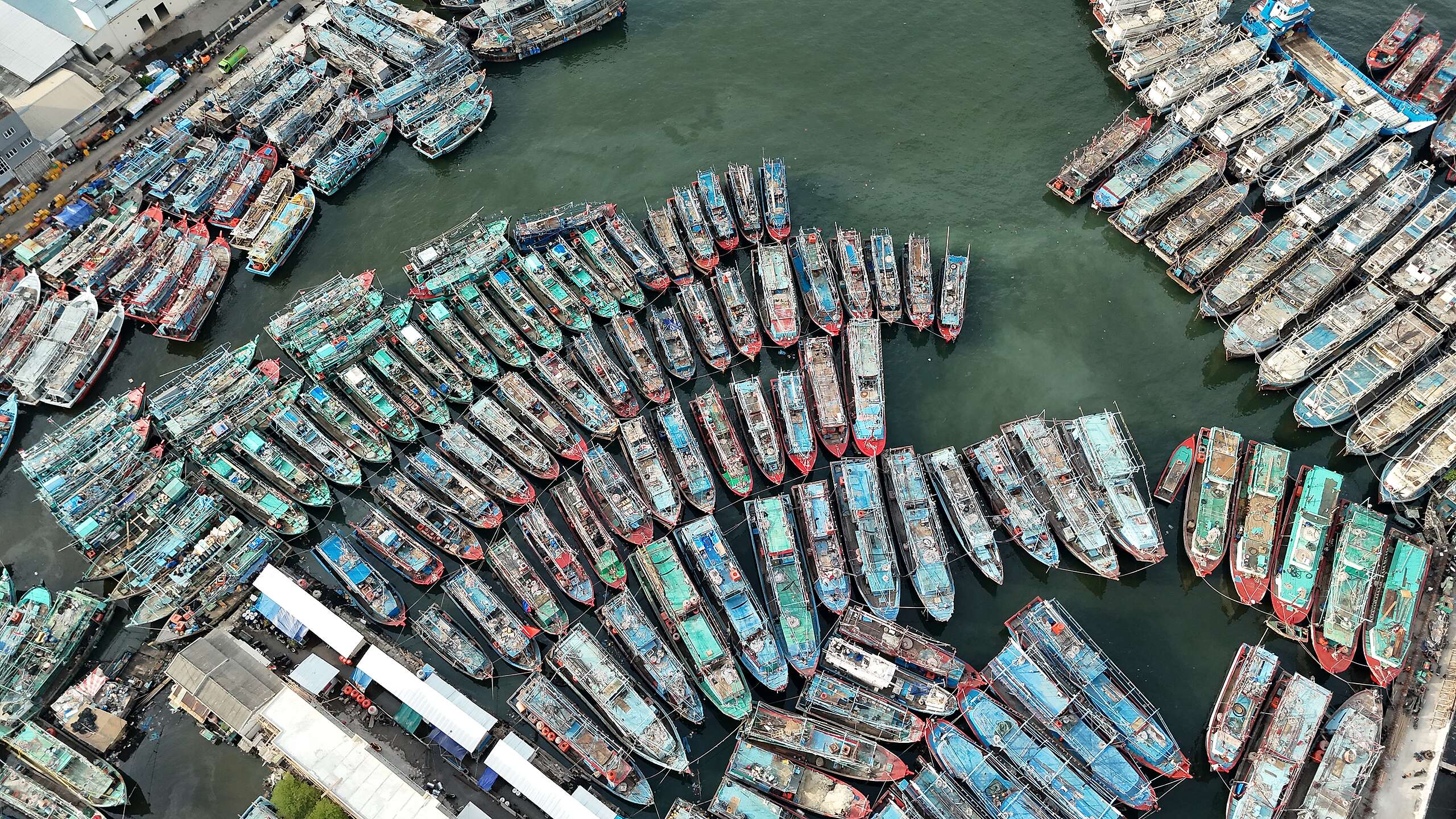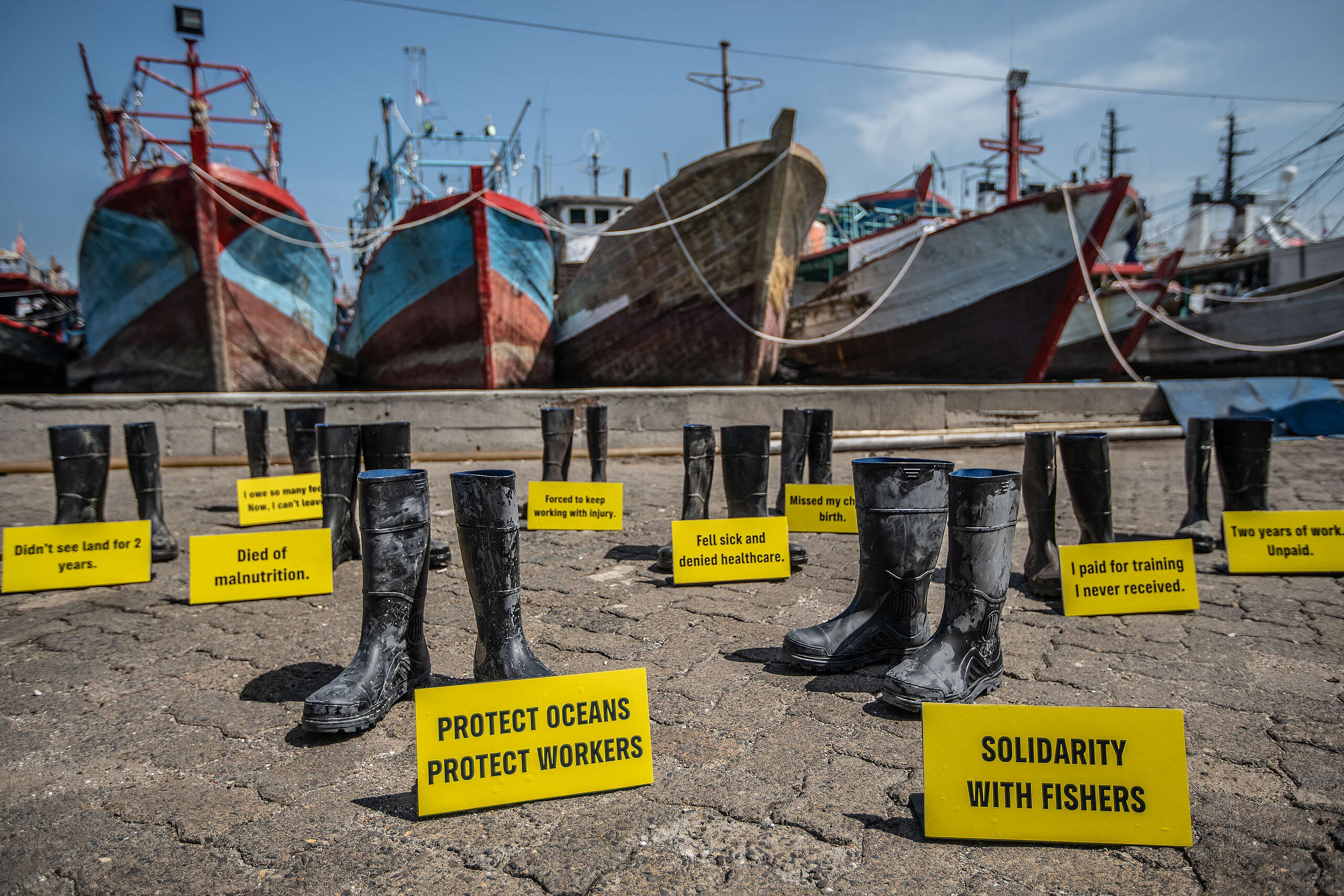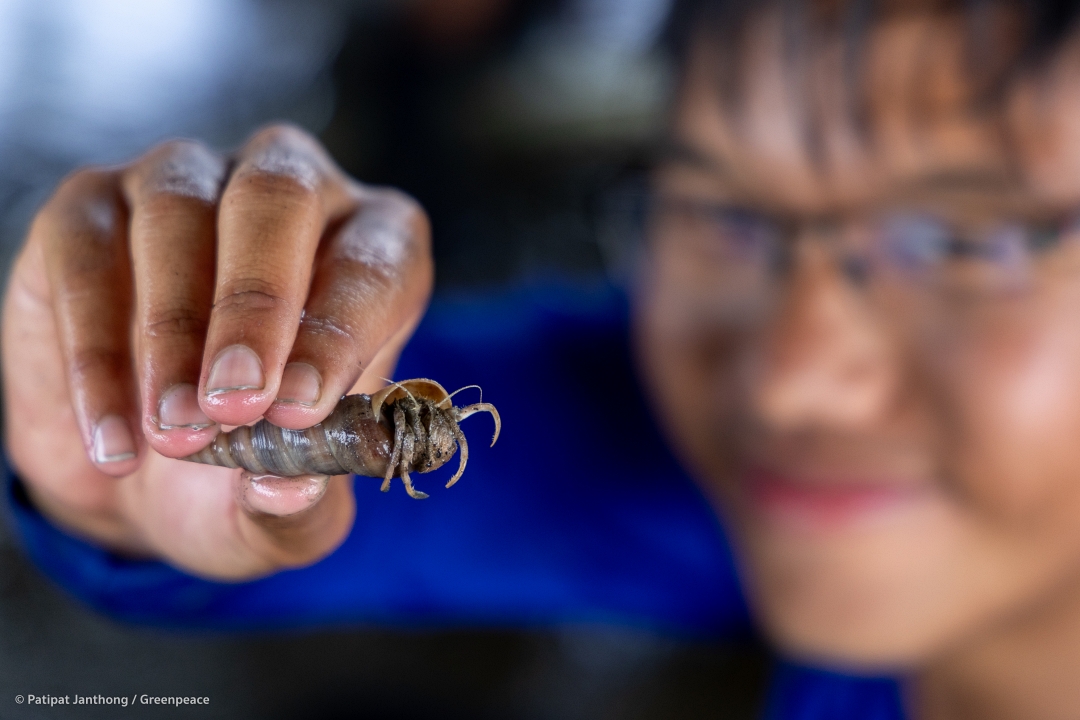I will never forget what the Deputy Director of the Migrant Workers’ Concern Desk – Stella Maris Taiwan, said to me mid-October 2025.
“In one year, we can finish up to 3 tons of rice,” said Hendrikus Arianto Ukat, also known as Father Arie.
The rice wasn’t for him, but for the many Indonesian migrant fishers who end up stranded in Taiwanese ports each year. Usually contracted for seasonal squid fishing, they end up abandoned for 4-6 months of the year when the squid fishing season is over. Stella Maris Taiwan–an international maritime charity supporting seafarers, fishers, and their families–steps in temporarily to support them until they find a way home.
The migrant fishers are usually promised three-year contracts, but in reality the squid boats are only at sea for 6-8 months of the year. The rest of the time the fishers are left to fend for themselves, far from home, without pay, without proper housing, but still bound by their contracts.
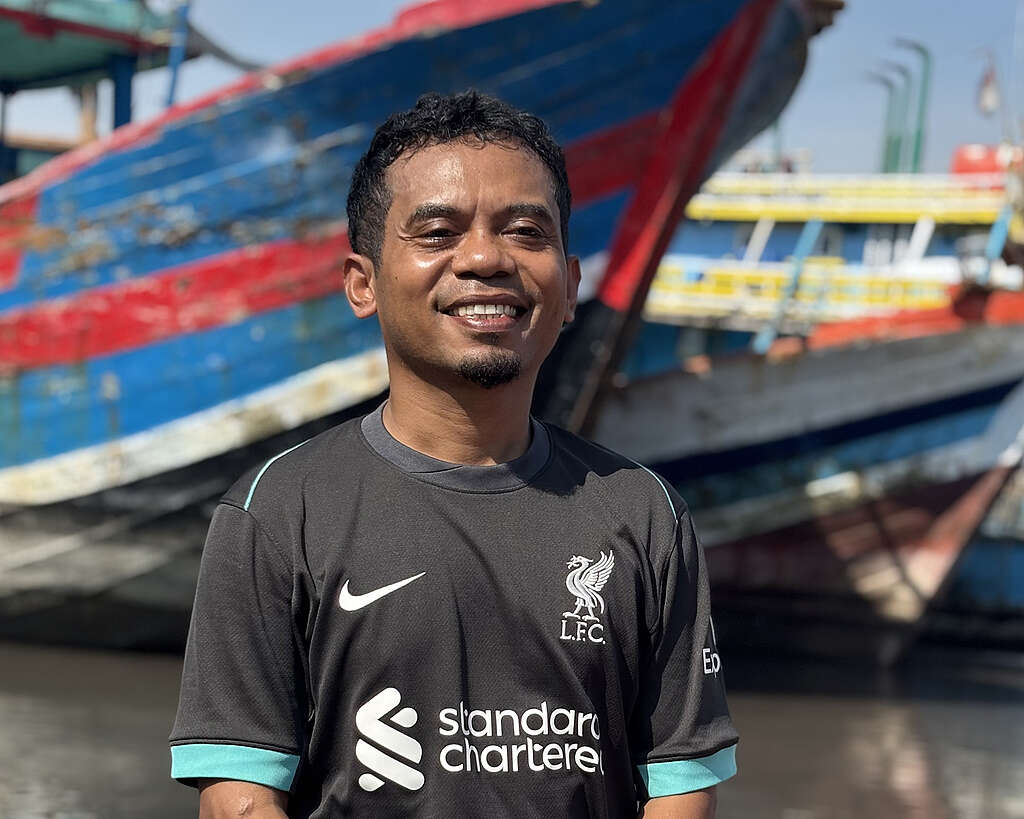
Father Ari at Tegalsari Port in Tegal, Central Java (© Gilang Ramadhan / Greenpeace)
Father Arie made that statement during a trip along the north coast of West and Central Java–locally known as Pantura. We visited the Indonesian epicenter of migrant fishers recruitment. Travelling along the Karangsong Harbor pier in Indramayu in West Java, we then headed east along the harbor in Cirebon, and stopped at Tegalsari Harbor in Tegal, Central Java.
In these ports, we finally saw where the fishers’ dreams were born— the dream of having a better quality of life for their families. We met communities who have been fishers for generations. We sat with them and listened to their stories of hope, and concerns about the future.
On October 15, 2025, Greenpeace Southeast Asia-Indonesia, the Indonesian Migrant Workers Union (SBMI), and Stella Maris Taiwan organized a discussion in Pemalang, Central Java. Present were representatives from the central and regional governments, labour unions, and ship crew recruitment agencies.
Trapped between two ministries
On paper, there are a series of regulations that provide strong protections for Indonesian migrant fishers—the Law 18/2017 on Indonesian migrant workers protection, the Government Regulation 22/2022, and the Constitutional Court Decision No. 127/PUU-XXI/2023.
At its heart, this combination of regulations says one thing: migrant ships crew for fishing and trading vessels ARE Indonesian Migrant Workers. Thus, all parties responsible for their protection are coordinated under the Ministry of Migrant Worker Protection.
However, Hariyanto Suwarno, Chairman of SBMI, calls this “a tiger on the paper”. Based on SBMI’s observation throughout the years, each institution only works for their own best interests.
Hariyanto particularly called out the Ministry of Transportation for committing, what he called, defiance against the law. He referred to the fact that, after the issuance of the Government Regulation 22/2022 and the Constitutional Court Decision No. 127/PUU-XXI/2023, the Ministry of Transportation no longer has the authority to issue permits for the recruitment agencies and all permits must be issued by the Ministry of Migrant Worker Protection. Yet, to this day, the Ministry of Transportation continues not to honour the agreement, but to issue these permits.
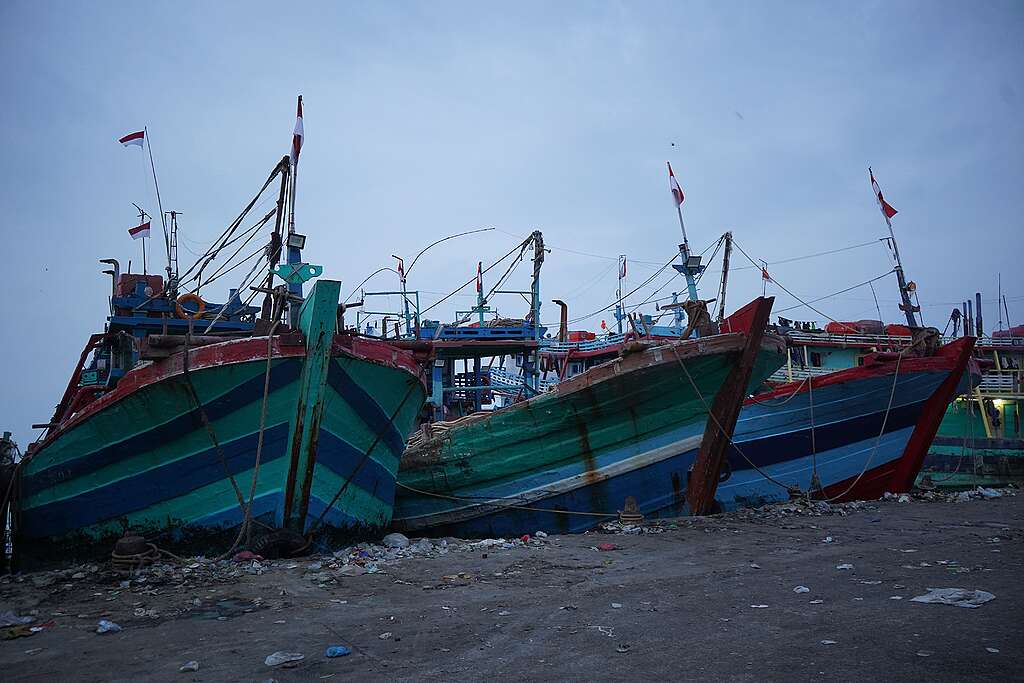
Tegalsari Port, Tegal, Central Java. (© Gilang Ramadhan / Greenpeace)
Amidst this bureaucratic turbulence, recruitment or manning agencies are trapped.
Hengki Wijaya, Chairman of the Indonesian Maritime Crewing Agents Association (IMCAA), voiced their frustration. “We’re being pushed around,” he complained. He said he is confused about which rules to follow.
Herman Suprayogi, director of a manning agency, took the microphone. It was clear from his tone, he wasn’t just frustrated—he was angry.
“I’m so done with discussions like this,” he said. He explained that the regulatory chaos has left them with no choice but to break the law in order to stay operational. Herman’s company usually sends around 100 migrant fishers per month. Meanwhile, there are more than 50 manning agencies in Pantura.
“It’s as if we are surrounded by wrong choices. Hospital on our left, grave on the right, and jail in front of us,” Herman said.
The frustrations felt in the room that day left no doubt that uncertainties at the ministerial level in Jakarta have made many people’s lives difficult – those working along the recruitment chain, as well as the fishers themselves.
According to the Ministry of Migrant Worker Protection, there are around 3,000 Indonesian migrant fishers working on distant water vessels.. However, based on his observations during his time with Stella Maris Taiwan, Father Arie estimates that there are more than 18,000 in Taiwan alone (around 11,000 on the high seas and around 7,000 in territorial waters). Hundreds of thousands more? Undocumented.
Time is ticking
Arifsyah Nasution, Oceans Campaigner for Greenpeace Southeast Asia, said that the international community will not wait for Indonesia to catch up. The Western and Central Pacific Fisheries Commission (WCPFC) has adopted the Conservation and Management Measure on Crew Labour Standards. They’ve set January 1, 2028, as the deadline for Indonesia to register its licensed manning agencies.
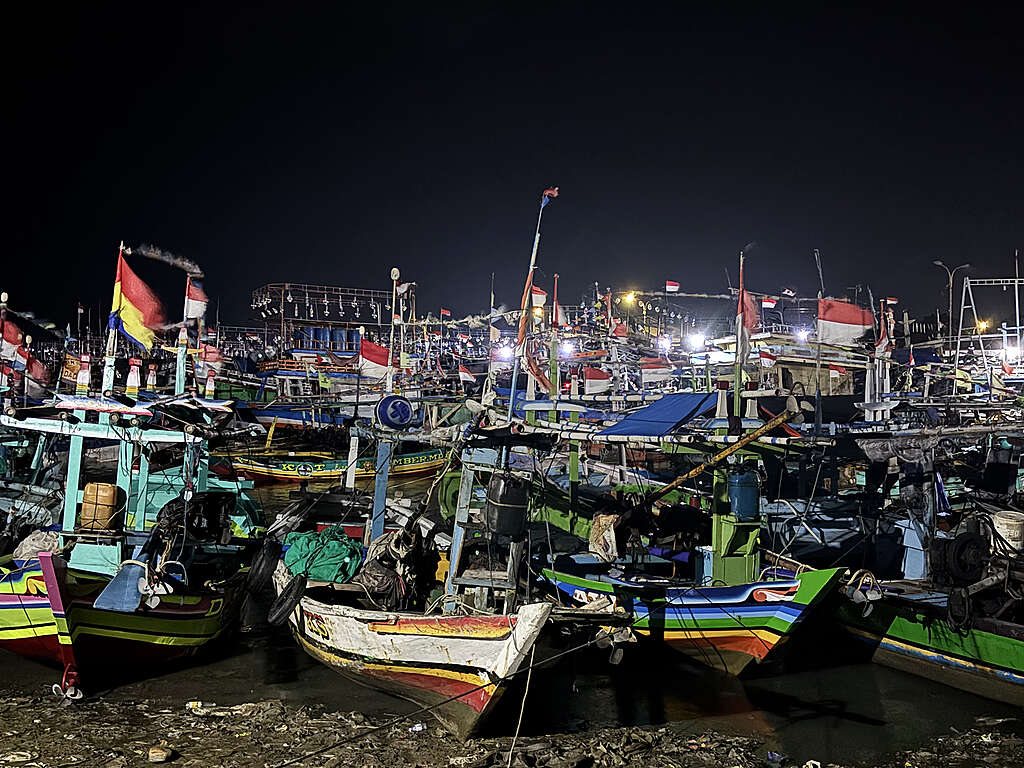
Cirebon Port in West Java. (© Gilang Ramadhan / Greenpeace)
The Indonesian President, Prabowo Subianto, has promised to ratify ILO Convention No. 188 concerning Work in Fishing (C-188), but this also hangs in the balance. How can international standards be ratified if an agreement cannot be made on who has authority within Indonesia, or about who is accountable to the law? The participants of the discussion agreed that this issue must be heard by the president.
Our journey along Java’s northern coast ended with an ironic conclusion. The problems faced by Indonesian migrant fishers do not happen only at sea. The biggest problems are seeded in air-conditioned meeting rooms in Jakarta where the people responsible for their safety pass the buck to one another.
Father Arie said, “When we destroy one person’s dream, we destroy the dream of an entire family.” In the end, I realized that the dreams of thousands of fishers’ families in the northern coast of Java weren’t wrecked by storms at sea. They were shattered by the anchors of their own government’s sectoral egos.
Gilang Ramadhan is Media and Communications officer for Greenpeace Indonesia ocean campaign’s Beyond Seafood project

